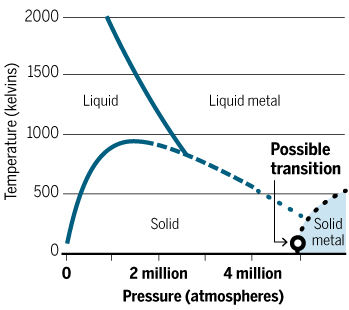In recent days scientists in Havard find a way to turn hydrogen into a metal. So What's the meaning of such a discovery (you know this relative paper has published in science) and what's the influence for our future life for such an amazing substance? Will it also revolutionize the modern physics just like the discovery of graphene (I mean the discovery of graphene has open the door of relativistic condensed matter physics)?
-
2$\begingroup$ You are asking quite a broad set of questions here. Which question is is in particular you want to have answered? The title-question of one of the questions in the main text? $\endgroup$– Mikael FremlingCommented Feb 1, 2017 at 13:18
-
$\begingroup$ The question you ask in the title is completely unrelated to the questions you ask in the body. The title question is actually answerable, but I'm not sure what you're really interested in knowing here. $\endgroup$– Trixie WolfCommented Feb 1, 2017 at 13:38
-
$\begingroup$ Why is the whole body of your question a quote? Is it someone else's question, not yours? $\endgroup$– RuslanCommented Feb 1, 2017 at 15:56
-
$\begingroup$ I have modified my title to contain my body. $\endgroup$– JackCommented Feb 2, 2017 at 0:00
1 Answer
Why is it so difficult to form metallic hydrogen?
Failure of the diamond press is a problem in the creation of solid hydrogen which, at these pressures also goes through several shifts in crystal formation, but the claim now is that a metal has been formed.
To create solid hydrogen involves the following technique:
First, scientists place a thin metal gasket between two flat-tipped diamonds. The gasket holds the hydrogen in place between the tips as the diamonds are cranked together. The intense pressure can force hydrogen into defects on the surface of the diamonds, causing them to become brittle and crack. So researchers have learned to apply transparent protective coatings to their diamonds. But the additional material makes it tricky to interpret laser measurements of what's going on in the center. Furthermore, past pressures of about 400 gigapascals (GPa)—about 4 million times atmospheric pressure—the hydrogen turns black, preventing laser light from getting in.
Extract and Image From Metallic Hydrogen : Sciencenews
In recent days scientists in Havard find a way to turn hydrogen into a metal. So What's the meaning of such a discovery (you know this relative paper has published in science) and what's the influence for our future life for such an amazing substance
This result is, to put it mildly, in dispute.
Claims for it's potential use include:
Room-temperature superconductors, to be used in magnetic-levitating trains or MRI machines that that do not require the material to be cooled to liquid helium temperatures.
An extremely powerful rocket fuel.
How this could be achieved on a large scales remains to be explained, as does how the researchers involved plan to remove the tiny amount of whatever they really do have, from the diamond tipped press their sample currently resides in. I am guessing completely here, but even with the pressure released, there might still be very strong adhesion between the substances.
Will it also revolutionize the modern physics just like the discovery of graphene (I mean the discovery of graphene has open the door of relativistic condensed matter physics)?
As of writing, the complete experimental setup is sitting under high pressure in the lab, awaiting further tests. What they will get when the pressure is reduced is also still a mystery, particularly as to its stability at normal pressure. If it is metallic hydrogen, and it can be produced in industrial quantities, then it could be a big deal. But one researcher in the same field has described the results as "complete garbage". So we can only wait and see.
-
1$\begingroup$ This answers everything except the question in the title. $\endgroup$ Commented Feb 1, 2017 at 13:36

